The Australian players sacked Justin Langer and picked their next coach – what happens next is up to them
It’s naive to expect Australia wouldn’t face fallout from their World Cup demise connecting back to Justin Langer. But how much of it is fair?
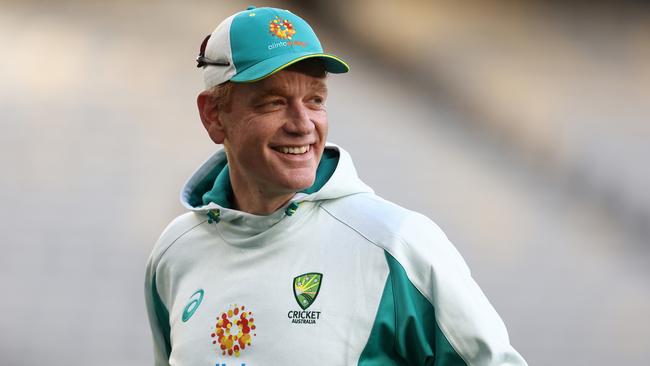
Cricket
Don't miss out on the headlines from Cricket. Followed categories will be added to My News.
Following Australia’s disappointing World Cup exit a former player, still closely connected to the professional game – and one of Justin Langer’s most ardent supporters – was asked about how culpable the new coach should be for the failed campaign.
The response: “Mate, Andrew McDonald is the best thing Australia’s got going for them.”
Emotions are still raw over Langer’s departure and how it might hang over the team this summer, but the record needs to be set on two key points:
No. 1 Justin Langer’s coaching record was not as great as some may have remembered through rose coloured glasses. Winning a World Cup and an Ashes in his final months certainly made it a harder decision for Cricket Australia to oust him, but during his tenure Langer had lost two home summers against India. His legacy was the way he led a turnaround in culture following Sandpapergate and because of that his departure was poorly handled by CA. But overall, the fact is his coaching record was mixed.
No. 2 When senior players in the dressing room spearhead a process for a coach as established in the cricketing community, and as popular with the general public, as Justin Langer to be sacked (which is what happened) – and the new regime then suffers a disappointment like being knocked out of a home World Cup – then scrutiny is going to come and questions are going to be asked. That’s not an agenda. That’s just the laws of the jungle.
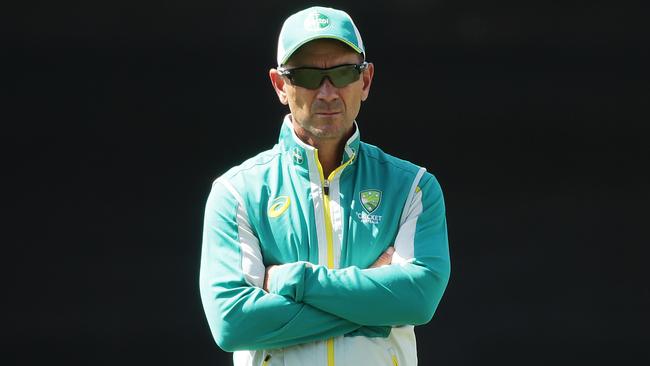
It’s naive to expect Australia wouldn’t face fallout from their World Cup demise connecting back to Langer, given the profile of his messy departure last February.
But it is easier to put McDonald under the pump for what happened in the World Cup – when really it is the players who need to reflect on what didn’t work.
The players got the type of coach they wanted – and McDonald is a good coach. Now it’s up to them even more than him to make it work, and players have bounced back well in the one-day trouncing of England.
When Australia created history by winning in Pakistan earlier this year, the underplayed story was it was McDonald and Pat Cummins who put together the attritional game plan to beat the home side over 15 days of Test cricket. And it worked better than any plan Australia has taken to the subcontinent in a long time, with Australia winning in the final session of day 15.
World Cup winners England credited the player-led environment cultivated by their new coach Matthew Mott for setting the platform for achieving white ball glory at the MCG last week.
It was revealed Mott didn’t make a single training session compulsory, and it was left up to players to simply let him know whether they were turning up or not.
In McDonald, Cricket Australia chose the best coach available and a coach who operates in exactly the same style that is working for a powerhouse like England.
What happened with Langer had nothing to do with McDonald. He is who he is as a coach and it’s not his fault he is a different style of operator.
Therefore it’s on Australia’s players to prove over the long haul they have the discipline, work ethic and culture to justify the player-led coaching model they pushed so hard for and have been trusted with.
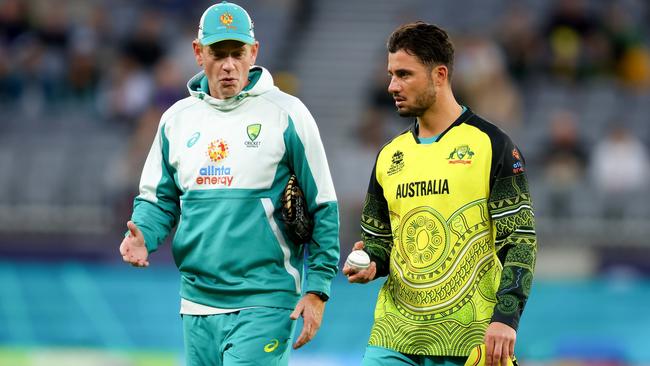
Cummins has once again proven he is the standout leader in Australian cricket, by privately meeting with Adam Gilchrist in a bid to ease tensions that erupted, indirectly pitting former players and the current group on opposite sides of the divide last summer.
It’s a sensitive and practical approach by Cummins, the game’s most important asset.
But the emotion expressed last summer by prominent commentators – former teammates and mates of Langer – does not necessarily make it an “agenda,” even though it’s understandable current players felt trapped by it at the time.
Mark Waugh wrote a column in News Corp this week about the hangover from Langer.
Waugh is a black and white straight shooter who calls it as he sees it.
When he stood in the slips as a player he would appeal if he thought it was out and wouldn’t if he thought it wasn’t out.
When the southern Sydney house of his brother Steve was beset by bushfires one year a reporter asked him if he was going to go down and lend a hand.
“Mate, I’m not a firefighter,” was Waugh’s response.
The point being, Waugh is not an overly emotional person. He might have played with Langer but he’s not his best mate.
Much like Shane Warne, Waugh’s shooting from the hip opinions might ruffle feathers in the Australian camp. But they’re opinions not an agenda.
For Australia’s new player-led approach, the proof will be in the pudding this summer and in next year’s massive assignments in India and England.
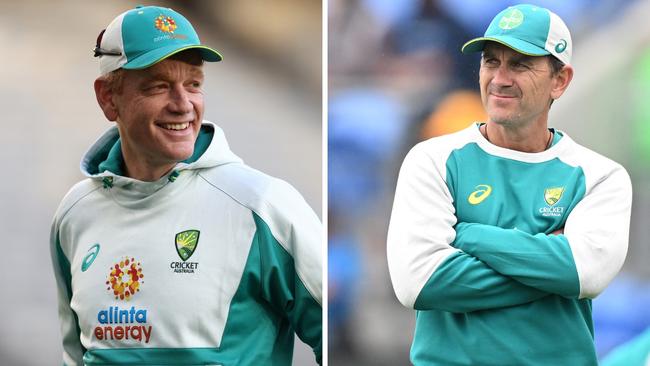
CAPTAINCY SHOCK FAILS TO STALL AUSSIES’ SERIES ROUT
Steve Smith has returned to Bradmanesque form but is pondering his leadership future, following Australia’s shock decision to name Josh Hazlewood back-up ODI captain.
Skippering fast bowlers seems to be working well for Australia as they secured a hugely impressive 2-0 one-day series victory over England at the SCG, with Hazlewood seamlessly filling in for the rested Pat Cummins, taking two key wickets alongside a four-wicket masterclass from Mitchell Starc in the resounding 72-run win.
The bizarreness of the Hazlewood captaincy call is not a knock on the highly regarded quick, but in the fact Smith is the Test vice-captain and is trusted in that prestigious arena to lead Australia in Cummins’ absence — which happened last summer when he took the reins successfully in Adelaide.
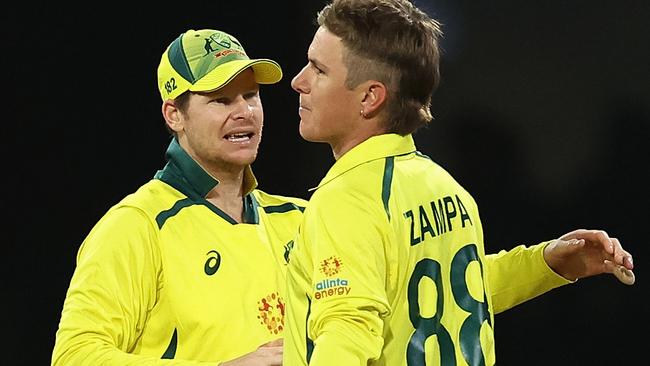
In that sense, Saturday’s out of the blue decision must feel like a snub for Smith, not that he showed he was carrying any hang-ups, as he smashed 94 to follow up from his 80 not out in Adelaide which he already described as the best he has felt at the crease in “six years.”
A hundred beckoned in Sydney, but Smith was caught agonisingly on the boundary rope attempting to bring up the milestone with a six.
Smith has openly coveted a return to the Australian captaincy post taken from him after sandpapergate, but perhaps his lukewarm response to questions back in September about taking over the ODI reins from Aaron Finch impacted selectors’ thinking.
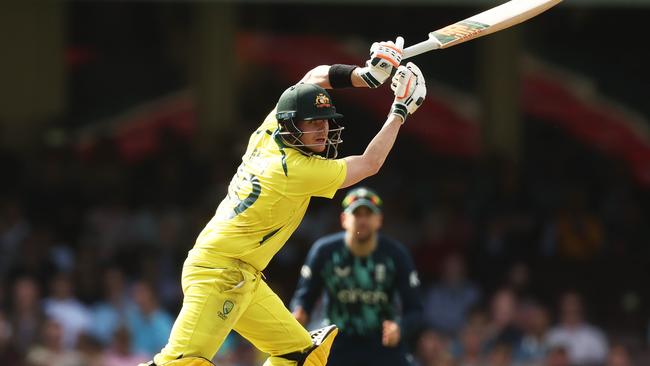
“I can’t say what would happen if they asked me,” Smith said at the time.
“I don’t know. I honestly don’t know what to do right now.”
Cricket Australia is still dragging its feet on David Warner’s leadership ban so he couldn’t be considered to deputise for Cummins, but the Hazlewood appointment suggests he is now at least ahead of Smith and another former ODI captain Alex Carey in the pecking order, although selectors won’t lock themselves into any set No.2 on the road to the World Cup.
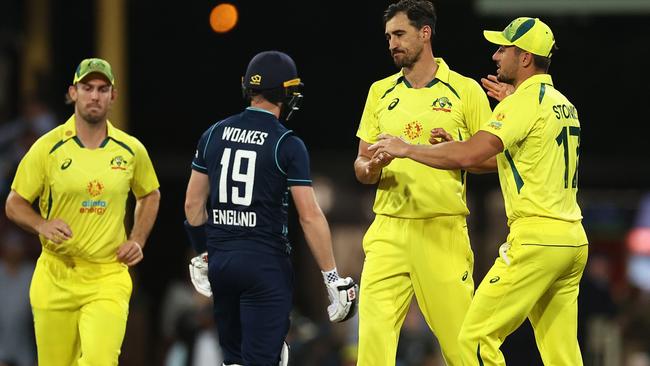
Adding to the intrigue is that by naming Cummins captain, Hazlewood may legitimately struggle to make the Australian first-choice XI for a World Cup in India, given only two specialist fast bowlers might be picked and Mitchell Starc is a left-arm point of difference.
Starc (4-47 from 8) was back to his blazing white ball best on Saturday night, claiming two first over wickets at the SCG, which included an unplayable delivery to remove Adelaide century-maker Dawid Malan for a third ball duck — a timely reminder of his devastating abilities in the wake of his shock World Cup axing.
Set 281 to win, England threatened to stage a bold fightback from the early Starc onslaught which left them reeling at 2-0 and then 3-34 once Hazlewood peppered Phil Salt. But the new captain stood up to be counted in his unexpected leadership promotion to break the shackles of a dangerous 122-run stand between James Vince and Sam Billings when he trapped Vince lbw for 60.
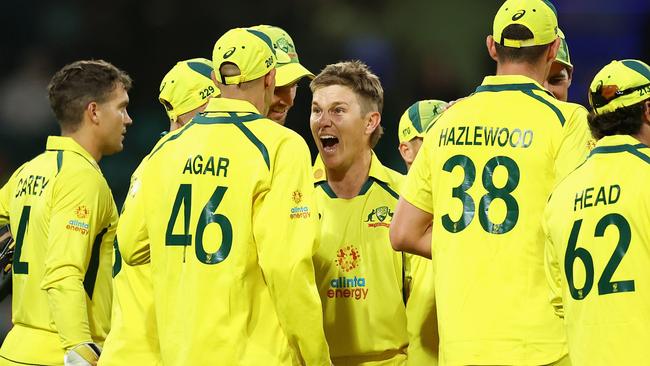
Moeen Ali came in and smashed Adam Zampa for back-to-back boundaries, but the leg-spinner bowled the England stand-in skipper same over and then knocked over Billings (71) and Sam Curran in quick succession to kill off the English challenge and show why he is now strongly pushing for a shock Test call up in India next year.
Zampa (4-45) is a genius white ball bowler and absolutely crucial to Australia’s 50-over World Cup plans in India which are off to an extremely encouraging start after routing current champions England, on Saturday in less than 39 overs.
Hazlewood won the toss and chose to bat first, with Smith, Marnus Labuschagne (58), Mitchell Marsh (50) fueling the competitive 8-280 total on a tricky pitch, with Australia’s ODI World Cup batting order taking nice shape after opener David Warner and Travis Head starred in game one.
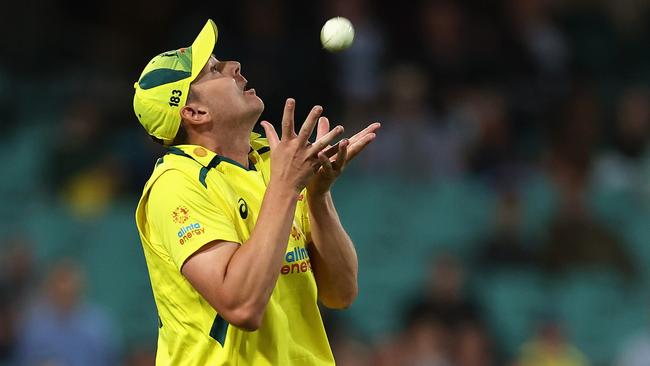
Only 16,993 turned up at the SCG on a pristine Saturday afternoon for cricket in Sydney between Australia and its biggest rivals in further proof the sport is at a crossroads in this country.
Australia were within their rights to rest Cummins in anticipation of his Test workload, and particularly to send Cameron Green home to Perth after the gun all-rounder pulled up sore from the first ODI.
But for both the Australian and England captain Jos Buttler to not feature in the second game of a three match series, only reinforces the irrelevance of 50-over cricket outside World Cups and begs the question how it can continue to survive as a format, at least in Australia.
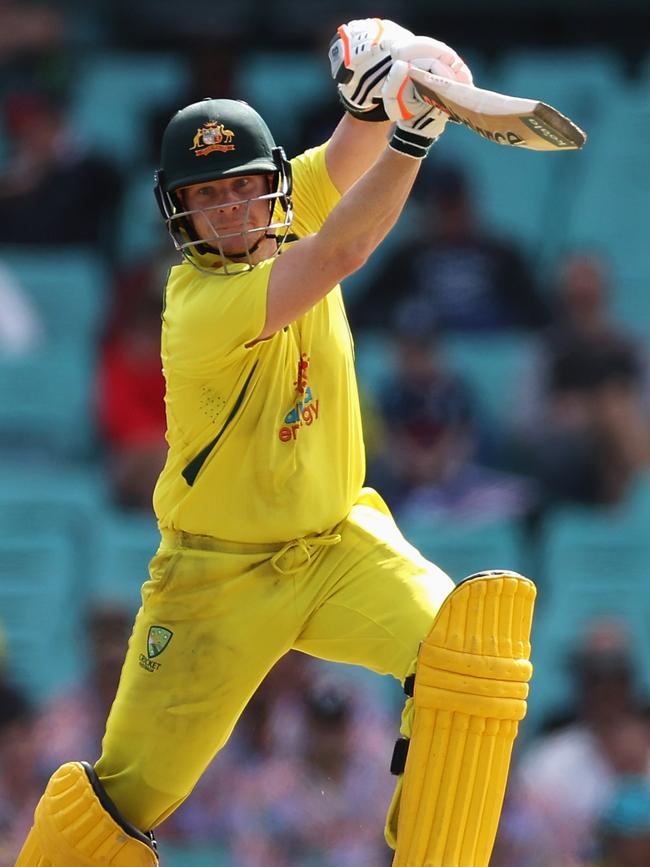
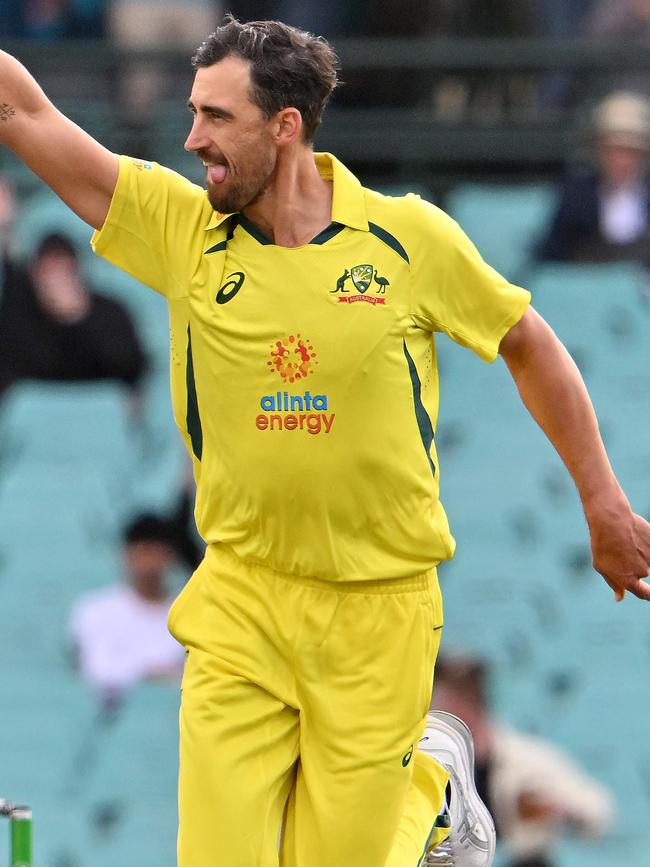
The public aren’t fools and much to the frustration of broadcasters, the product they pay top dollar for has become a clear last priority due to cricket’s unsustainable scheduling issues which are making so many international games irrelevant.
Australia don’t need to make any apologies for making Test cricket its No.1, but with Twenty20 internationals and leagues jamming the schedule, something has to give, and mounting evidence suggests 50-over cricket is now little more than content filler.
It’s not an excuse for administrators to point to November as always being soft for crowds — not when Australia has just hosted a brilliant World Cup. The game has a responsibility to make itself better for fans than the current model allows.
No captaincy but more runs for Smith
The shock call to appoint Josh Hazlewood interim captain over Steve Smith has not stopped the batting master’s return to Bradmanesque form at the SCG.
Australian selectors decided to rest skipper Pat Cummins for the second ODI against England as part of a finely-tuned plan to get his preparations cherry ripe for the Test summer, and also elected to send all-rounder Cameron Green home to Perth after he pulled up sore from the opening match.
But the bombshell call was the naming of Hazlewood as captain in Cummins’ absence, hugely significant, because as a fast bowler it’s entirely possible Cummins will miss more matches on the road to next year’s World Cup, and potentially even during the big tournament itself.
CHECK BACK FOR FULL ANALYSIS AFTER PLAY TONIGHT
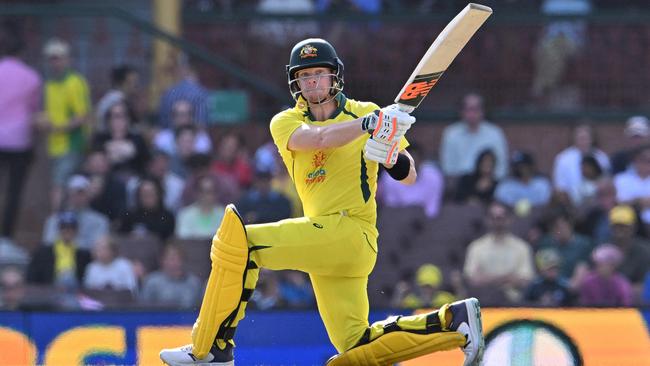
It’s mysterious that Smith would not have simply slotted into replace Cummins, given the former all-format captain and Test vice-captain stepped up when Cummins was ruled out of last summer’s Adelaide Test due to Covid.
Out in the middle, Smith picked up from where he left off with his 80 not out in game one, to execute another masterclass against England in Sydney.
On 94 and attempting to bring up a deserved triple figure score with a six as Australia looked to up the ante in the last seven overs – Smith was agonisingly caught on the fence off the bowling of Adil Rashid.
Australia ended up 8-280 after Hazlewood chose to bat first, with Ashton Agar smashed 18 not out off 12 to negate the rapid-fire dismissals of Marcus Stoinis (13), Mitchell Marsh (50) and Mitchell Starc (golden duck) at the death.
Smith was filthy at himself as he failed to register a prized ton, but the signs are all good for a big summer.
Openers David Warner and Travis Head both threw away chances for big scores, but Australia’s top order is looking extremely well balanced a year out from the 50-over World Cup in India, with Marnus Labuschagne (58) also getting into the runs at No.4.
But the crowd at the SCG was mediocre and there must be huge concerns over the long-term survival of the format.




